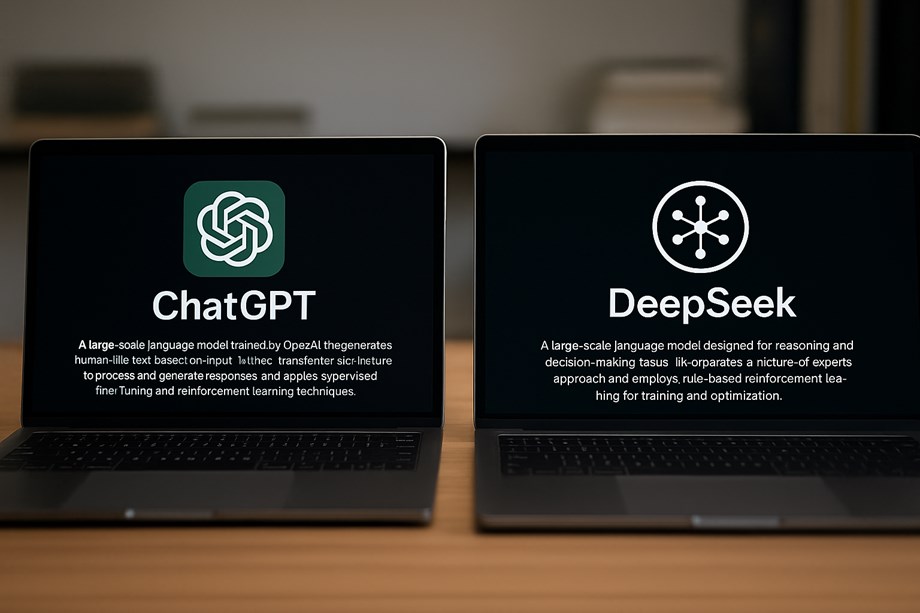DeepSeek-R1 outperforms ChatGPT on critical reasoning benchmarks while slashing operational costs, according to a new peer-reviewed analysis that could redefine AI model selection for enterprises and governments.
Published in Frontiers in Artificial Intelligence, the paper titled “DeepSeek vs. ChatGPT: Prospects and Challenges” presents a comprehensive review of both models, assessing their strengths, weaknesses, and domain-specific capabilities in reasoning, cost efficiency, transparency, and ethical deployment.
While ChatGPT has become widely known for its general-purpose fluency, conversational depth, and creative output, DeepSeek is emerging as a purpose-built solution for reasoning-heavy tasks, particularly in budget-sensitive or audit-intensive environments. The study presents an in-depth examination of how DeepSeek’s rule-based reinforcement learning approach and open-source framework position it as a more specialized alternative to ChatGPT’s commercially maintained architecture.
How do DeepSeek and ChatGPT differ in design and function?
At the architectural level, both models rely on the transformer framework, but diverge in parameter structure and design philosophy. ChatGPT operates with a dense parameter system where all weights are active during each inference, resulting in high general-purpose performance and polished natural language output. This setup, however, demands extensive computational resources.
In contrast, DeepSeek-R1 introduces a Mixture of Experts (MoE) framework, activating only a subset of its 671 billion parameters for each token prediction. This modular design significantly reduces the model’s memory and compute requirements. DeepSeek also incorporates Multi-Head Latent Attention (MLA), which compresses memory caches to support long-form or complex reasoning tasks.
Beyond architecture, the training strategies also diverge. ChatGPT is built using supervised fine-tuning (SFT) followed by reinforcement learning from human feedback (RLHF), aligning outputs with human preferences. DeepSeek, on the other hand, skips preliminary SFT and instead performs multi-stage reinforcement learning with rule-based reward modeling, prioritizing accuracy and structured reasoning over stylistic fluency.
These distinctions shape each model’s utility: DeepSeek for cost-conscious technical domains, and ChatGPT for flexible, user-facing dialogue systems.
Which model excels in accuracy, transparency, and real-world use cases?
Benchmark comparisons in the study show that DeepSeek outperforms ChatGPT in structured tasks like mathematical problem-solving and coding precision. It scored higher on reasoning benchmarks such as MMLU and GSM8K, with DeepSeek reaching 90.8% accuracy on MMLU compared to ChatGPT’s 86.4%. However, ChatGPT led in overall correctness and speed in scientific computing tasks, while demonstrating superior conversational coherence and adaptability.
In terms of transparency, DeepSeek’s open-source nature allows full codebase inspection, making it suitable for sectors like healthcare and finance where auditability is critical. However, this openness comes with caveats. While the model is technically open-source, limitations in public access to its training data may create issues of “open-washing,” where transparency claims are undermined by selective disclosure.
ChatGPT’s closed-source nature restricts external audits but offers polished, natural-sounding responses, making it ideal for customer support, business communications, and general education. Despite its fluency, the model is less transparent in how it arrives at specific outputs, raising concerns in high-stakes or compliance-driven environments.
The study also compares cost implications. DeepSeek’s inference cost for one million tokens is significantly lower ($2.19) compared to ChatGPT’s ($15), with development costs reportedly under $6 million versus over $100 million for ChatGPT. These cost differences could influence adoption across startups, academic labs, and public sector agencies where budgets are constrained.
What are the broader implications for AI deployment and governance?
The research identifies substantial implications for future AI system design, especially around issues of explainability, cost governance, and ethical deployment. DeepSeek’s rule-based reward modeling, which separates accuracy and format incentives, is optimized for scenarios demanding high reasoning fidelity, such as data science, algorithmic trading, and telemedicine assessments.
Yet, this same design requires users to be highly skilled in prompt engineering. Unlike ChatGPT, which accommodates natural, casual queries, DeepSeek may demand more structured inputs, potentially limiting its accessibility for non-technical users. Moreover, its bilingual architecture, primarily English and Chinese, may introduce language-mixing issues or cultural biases in multilingual deployments.
Ethically, DeepSeek’s flexibility places more responsibility on users to prevent misuse. Without built-in safety protocols, there is a greater risk of harmful or biased output if safeguards aren’t actively implemented. ChatGPT, with its RLHF-trained content filters and user data logging, is better equipped with automated moderation features but raises privacy concerns due to its reliance on cloud-based user data storage.
The study also addresses regulatory challenges. DeepSeek’s data hosting, reportedly linked to servers in China, could raise red flags in jurisdictions with strict data residency laws. Meanwhile, ChatGPT’s U.S.-based infrastructure, while more trusted in some global regions, faces its own scrutiny under privacy frameworks like GDPR.
Both models, despite their differences, face shared challenges: black-box reasoning, model hallucinations, training data quality, and potential job displacement from automation. The authors emphasize that neither model currently dominates across all metrics; instead, the ideal choice depends on aligning model capabilities with application-specific needs, be it transparency, cost, accuracy, or linguistic flexibility.

